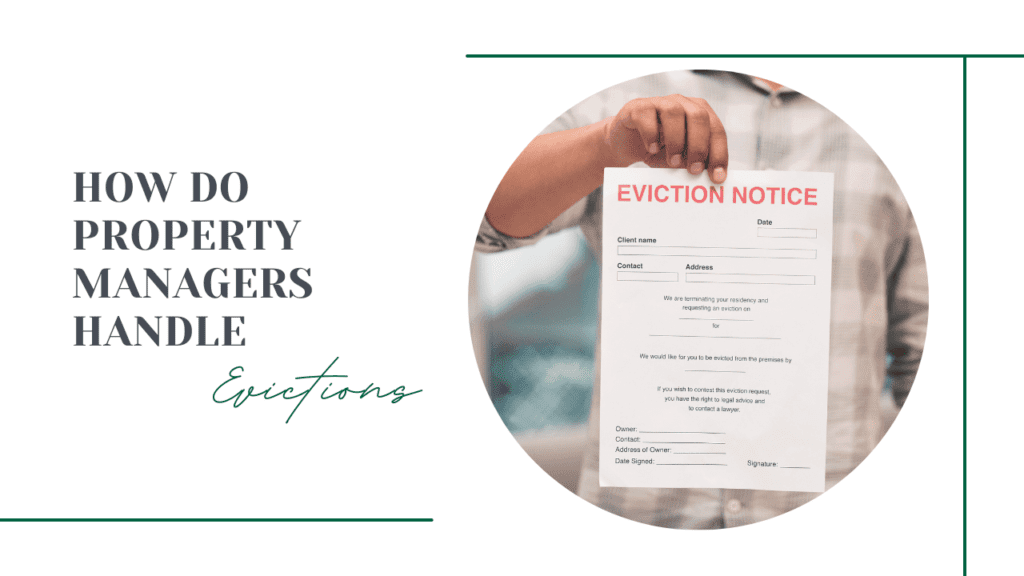
Most evictions in Nebraska are due to nonpayment of rent, lease violations, or criminal activity that is taking place at the property.
We believe that the best way to manage an eviction is to avoid it. We’ll talk first about the process you must follow when you are evicting a tenant, and then we’ll talk about what you can do to prevent this situation.
While avoiding eviction is always better than pursuing one, we are an Omaha property management company, and we understand that sometimes there is simply no other option. Delinquent tenants are one of the biggest problems a landlord can face, and state laws provide the necessary procedures landlords must follow to evict them.
To evict a tenant in Nebraska, you’ll need to start with a written notice and then follow up in court.
There are different kinds of notices for different situations, but otherwise, the process is essentially the same. While evicting an Omaha tenant isn’t as difficult as it is in other rental markets, we still recommend that you get professional help before moving forward. Talk to an eviction attorney or get some advice from a property manager. We can share all of our resources with you if it becomes necessary to evict your resident.
Serve Omaha Tenants a Written Notice
Every eviction in Omaha begins with a written notice. The notice period typically depends on why you’re trying to terminate the lease and evict the tenant.
- The eviction notice must state the time period (typically Three Day Notice or 30 Day Notice).
- The notice must state the reason for the eviction.
- The notice must state the ways in which the tenant can halt the eviction (paying the overdue rent or coming into compliance with the lease).
If you attempt to evict a tenant without following the proper protocols, you can be sued by your tenants. You cannot change the locks, you cannot enter the tenant’s home illegally and without notice. You cannot turn off the utilities or make threats. These are illegal eviction tactics, and you could find yourself in a lot of legal trouble of your own if you employ any of them.
Evicting for Nonpayment of Rent
The most common reason that landlords evict tenants is the nonpayment of rent. If you have not received rent from your tenant and the grace period has come and gone, get in touch with your resident. Maybe it’s a simple oversight. Maybe they’re ready to pay.
Even if your tenant provides you with a reasonable explanation and asks for a few more days, get your Three-Day Notice to Quit in order. You don’t have to move forward with the legal eviction if the tenant does come up with the money, but you want to have time to work on your side in case you do need to evict.
If the tenant pays the rent within the three-day period, you cannot proceed with the eviction any further. Your tenant has paid, the lease is intact, and they can stay in the property. If the three days come and go, however, and the tenant does not pay but they do pay a few days later, it’s up to you whether you accept it or proceed with the eviction through the court system.
Evicting for Lease Violations
Maybe you’re evicting for a lease violation. Perhaps there was property damage detected or your tenant refused to allow you inside the property with reasonable notice in order to look for maintenance issues. You might have discovered unauthorized pets or guests living in the home.
When you’re evicting for lease violations and reasons outside of nonpayment of rent, you’ll serve a 30 Day Notice to Quit.
In the notice, you’ll state that the tenant has 14 days to cure the problem and come into compliance. Otherwise, they must move out within the 30-day window.
If the tenant does remedy the violation within the 14-day period, you cannot move forward with the eviction. However, if the same lease violation shows up within the next six months, you can terminate the lease after giving a minimum of 14 days of written notice. That notice must state the breach and the date the lease agreement will terminate.
Moving the Eviction to the Courts
Hopefully, the notice will open a dialogue between you and your tenant and you’ll be able to avoid eviction. If not, you’ll need to move forward and file a Petition for Restitution with the county or district court clerk. The petition will set forth the facts upon which the eviction is based. You’ll need to provide some information about your property and include a copy of your notice, which must comply with the Uniform Residential Landlord and Tenant Act.
Along with the Petition for Restitution, you’ll need to file and serve a Summons and Complaint within three business days of its issuance. The Sheriff’s Civil Division can serve these documents to your tenants. If personal service cannot be made, a copy may be posted at the tenant’s last known address as well as mailed there.
The summons will include your court date. From that point, you’ll make your case to the judge and likely get your property back.
We think eviction can best be avoided with:
- Careful tenant screening
- Good tenant relationships
- Routine inspections
- Strong lease agreements that are consistently enforced
When you do find yourself having to evict, make sure you understand the process, and always reach out to professionals for help. Even the slightest mistake will have your case thrown out, and you’ll find yourself spending more money and wasting more time trying to get your property back.
 Our team would be happy to help you avoid eviction, and if necessary, work through one. We have experience in all sorts of situations, and we work with excellent attorneys who can help us navigate the courts with you. Please contact us at Kouri Management. We provide expert leasing, management, and maintenance services in Council Bluffs, Iowa, and Omaha, Nebraska.
Our team would be happy to help you avoid eviction, and if necessary, work through one. We have experience in all sorts of situations, and we work with excellent attorneys who can help us navigate the courts with you. Please contact us at Kouri Management. We provide expert leasing, management, and maintenance services in Council Bluffs, Iowa, and Omaha, Nebraska.
